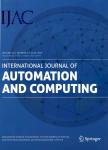Recent Advances in the Modelling and Analysis of Opinion Dynamics on Influence Networks
Recent Advances in the Modelling and Analysis of Opinion Dynamics on Influence Networks作者机构:Research School of EngineeringAustralian National University School of AutomationHangzhou Dianzi University Data61-Commonwealth Scientific and Industrial Research Organisation (CSIRO) Faculty of Science and EngineeringEngineering and Technology Institute Groningen (ENTEG)University of Groningen
出 版 物:《International Journal of Automation and computing》 (国际自动化与计算杂志(英文版))
年 卷 期:2019年第16卷第2期
页 面:129-149页
核心收录:
学科分类:12[管理学] 1201[管理学-管理科学与工程(可授管理学、工学学位)] 08[工学] 0802[工学-机械工程] 0701[理学-数学] 0811[工学-控制科学与工程] 0812[工学-计算机科学与技术(可授工学、理学学位)]
基 金:supported by the Australian Research Council (ARC) (No. DP-160104500) and Data61-CSIRO, Australia supported in part by the European Research Council (No. ERC-CoG-771687) the Netherlands Organization for Scientific Research (No. NWO-vidi-14134)
主 题:Opinion dynamics social networks influence networks agent-based models, multi-agent systems networked systems
摘 要:A fundamental aspect of society is the exchange and discussion of opinions between individuals, occurring in situations as varied as company boardrooms, elementary school classrooms and online social media. After a very brief introduction to the established results of the most fundamental opinion dynamics models, which seek to mathematically capture observed social phenomena, a brief discussion follows on several recent themes pursued by the authors building on the fundamental ideas. In the first theme, we study the way an individual′s self-confidence can develop through contributing to discussions on a sequence of topics, reaching a consensus in each case,where the consensus value to some degree reflects the contribution of that individual to the conclusion. During this process, the individuals in the network and the way they interact can change. The second theme introduces a novel discrete-time model of opinion dynamics to study how discrepancies between an individual′s expressed and private opinions can arise due to stubbornness and a pressure to conform to a social norm. It is also shown that a few extremists can create pluralistic ignorance, where people believe there is majority support for a position but in fact the position is privately rejected by the majority. Last, we consider a group of individuals discussing a collection of logically related topics. In particular, we identify that for topics whose logical interdependencies take on a cascade structure,disagreement in opinions can occur if individuals have competing and/or heterogeneous views on how the topics are related, i.e., the logical interdependence structure varies between individuals.



